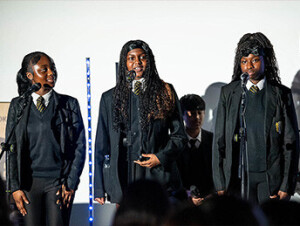Performing Arts

CURRICULUM ETHOS
In Performing Arts, students develop knowledge, skills and practical application through a sequenced and clear delineated structure of the wider school’s ‘Character and Academics’ approach to curriculum.
We use the study of drama and music to help students develop personal management skills, persistence, resilience, organisation, motivation, independence, understanding, openness, teamwork, commitment and confidence. All these virtues are transferable and lead to success.
Drama, Music and Performance help the students to communicate, enthuse and stimulate them in their learning. It is a way of expressing oneself and it can hugely influence the personal development of the students at Eastbrook. Drama and Music reflect the culture and society we live in and enables students to better understand the world they live in. The activities used in both Drama and Music are creative, fun and can be highly challenging. Drama and Music enthuse and encourages a love and passion for the elements of Performing Arts and to become proficient in a variety and range of disciplines. The Drama and Music curriculum aims to embed the necessary skills, knowledge, practical application through communicating these through both practical and the evaluation of their own practical work.
Through this process the students develop the virtues necessary to demonstrate and apply a high level of personal management skills when rehearsing performance skills. The students develop resilience, discipline, understanding as well as being open to feedback so at to improve and make progress when developing the skills and knowledge through applying these to their work. Students gain a coherent knowledge and understanding of the theories and practices used in the different styles and musical genres and styles of theatre. Students are equipped to think critically and justify their reasoning when evaluating musical and dramatic styles and genres of performances within the music and performing arts industry.
The Performing Arts Curriculum in Summary
Our KS3 curriculum ensures that students are exposed to a wide range of styles and genres within both Music and Drama through different musical styles and a range of genres including musical history, how music is constructed, singing, listening and appreciation, composing and performing/ instrumental performance in which they learn the keyboard, ukulele, guitar and drums as well as singing. Students explore the elements of music, the orchestra, Blues, Rock ‘n’ Roll, Disco, Classical and world music as well as Reggae and film playing different pieces of music within that style of music being explored.
Drama students explore a range of texts to develop understanding of different aspects of the world around us and allows them to explore the different contexts through a range of techniques such as improvisation, script work, and devising original pieces from a range of stimulus, whilst learning about theatrical styles and genres within theatre. Texts studied at KS3 include Oliver Twist, The Diary of Adrian Mole 13 ¾ and The Terrible Fate of Humpty Dumpty. We introduce students to older texts, DNA and Dulce Decorum EST. Our curriculum also allows students to write monologues, scripts and devise performances within the different styles of Naturalism, Epic, Mime and Physical Theatre including the working with masks. These are all performed and evaluated by the students developing both literacy and oracy skills when evaluating their work and the work of others.
At KS4 we follow the WJEC specification for Performing Arts, teaching the two subjects of Music and Drama side-by-side teaching a range of styles and genres in both Music and Drama. The subject is a 3 unit-based approach. Here we study the drama texts Blood Brothers, A Curious Incident of a Dog in the Nighttime and All my Sons in performance and the devising of their own pieces through understanding and applying the devising process from page to stage. The music students study Classical, Blues, Rock ‘n’ Roll and Reggae in performance and the creation of their own composition of their own chosen style of music. The final unit is an external exam where they produce a product from a set brief given by WJEC in their chosen artform.
An All-Through Curriculum
Our all-through curriculum from EYFS to KS4 builds on the key elements that students study through the curriculum where previous knowledge is retrieved and informs future learning. For example, the KS3 curriculum accounts for and builds upon the key elements that students have studied during KS2 in Music through developing an instrumental and singing programme of lessons at both Key Stages 1 and 2 where they access both rhythmic and melodic instruments in both Key Stages. Drama is taught discreetly through the English Curriculum and performances of music and drama is encouraged through all key stages as well as through an all through concerts.
Diversity and Inclusion in the Performing Arts Curriculum
The Performing Arts in both Music and Drama curriculum recognises and celebrates black excellence through the achievements and contributions of black people in this area. We recognise that it is essential for us to build in these opportunities, and for us to plan and deliver a curriculum that over time reflects our diversity and promotes our values.
Music students explore world music including African, Caribbean and south African music and how this music has contributed to the world of music. Students explore the blues and the origins and how the music was influenced by Gospel music and how this has influenced the power of black musicians and the different styles of music they created.
Drama students explore black excellence using well-known black actors and how they use the different drama techniques and key performances to demonstrate how they use the performance skills in their work.
In Music and Drama, we have an inclusive classroom practice ensuring all learners including those with SEND and EAL can engage through adapted resources, scaffolded tasks, and mixed-ability grouping. Our curriculum encourages a representation of all, allowing students to the different context and content that reflects their communities and cultures.
Cultural Capital and Enrichment in the Performing Arts Curriculum
We develop cultural capital by offering enrichment experiences beyond the classroom. We offer a weekly drama club as well as music clubs which include ukulele club, keyboard club and choir. The students perform in a Christmas concert which includes our Key Stage 1 and 2 students. Our Eastbrook’s Got Talent and drama performances are open to all students. We also offer educational visits to the theatre.
Literacy and Oracy in the Performing Arts Curriculum
Literacy and Oracy are an integral part of both Music and Drama. Music and Drama promote Literacy through the use of literacy mats for both key Stage 3 and 4, including key terms and subject specific vocabulary, which help the students understand them. The students when evaluating their practical work in both music and Drama will use both oral and written to explain and discuss the work. We use open –ended and higher order questioning, thinking time and making space for collaborative talk and oral rehearsal of answers using individual, pair and class discussion as well as group work. In both Music and Drama three written assessments evaluating their own performances are completed as well as one yearly spoken VIVA assessment. To support students in this and in verbal communication, we promote oracy within our classrooms through discussion, group work and practical performances.

